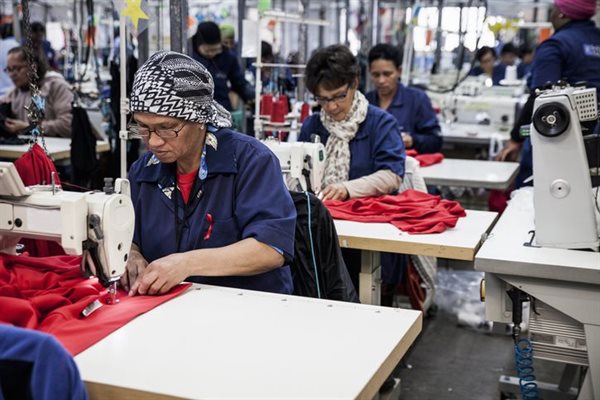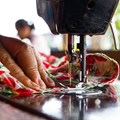As 1.5 million workers in the South African economy returned to work this week, Trade, Industry and Competition Minister Ebrahim Patel has met with representatives of the clothing textile, footwear and leather sector.

Getty
Monday’s virtual meeting with the sector was held to review the readiness of shops and factories for the new level four lockdown which kicked in on 1 May.
“The meeting agreed to develop a common framework on implementation of Covid-ready workplaces that can serve as a guide for the industry,” said the Department of Trade, Industry, and Competition (Dtic) on Tuesday.
The recent move from the hard lockdown to level four has seen greater parts of the retail and manufacturing value chain open up. Starting 1 May, clothing and footwear retailers started opening for customers to buy winter and children’s apparel and footwear.
This was the first time that dedicated clothing and footwear retailers have opened since the initial lockdown started on 26 March 2020.
Level four of the lockdown also enables manufacturers to begin manufacturing with at least 30% normal employment for all clothing, textile, footwear and leather goods; up to 50% for winter goods; and up to 100% for children’s and baby clothes, and personal protective equipment like face masks.
Collaboration is key
Retail CEOs provided the meeting with feedback on the reopening of stores and measures they have taken to manage the return to work.
Anthony Thunström, TFG's chief executive officer (CEO) and chair of the National Clothing Retail Federation (NCRF) welcomed the move to reopen clothing retail stores and noted the value of close collaboration between government and industry.
During the meeting, the Minister, retail CEOs, manufacturers and labour representatives engaged on matters that could be covered in the framework agreement for the industry to protect employees in manufacturing and retail. The framework also aims to protect customers in retail stores well.
CEO of Woolworths SA Zyda Rylands said the NCRF aims to support government’s initiatives.
“The spirit of collaboration within the NCRF is to support government’s initiatives. The terms of all back-to-work protocols starts with us. We [retailers] are a big employer of people, so if we take care of our workforce in support of government’s initiatives then we should also identify how to communicate to our customers the same health and safety protocols. We have capabilities to also support our customer to implement government’s initiatives, ” she said.
Meanwhile, the Apparel and Textile Association of SA’s (ATASA) chairperson Herman Pillay, said the industry should look into supporting more of government’s response efforts in workplaces.
The industry now has more than 350 manufacturers who have said they are ready to produce cloth face-masks, ranging from micro-enterprises employing a few people, to SMEs and larger firms.
Workplace safety
Proposals were heard on the phasing in of shift workers, social distancing for employees and customers and other necessary health protocols, to avoid a sudden increase in the spread of COVID-19 now that more parts of the retail and manufacturing are opening up.
Government provided details of the risk factors taken into account in the different alert levels and what could be done to reduce risks, enabling the economy to move more rapidly to Level 3 and below.
“As we navigate the uncharted terrain of the COVID-19 reality, it will take our collective efforts to ensure we reduce risks of infection while we reopen our economy and adjust to our new normal,” said the Minister.
Patel stressed that safety measures are essential.
“We are facing an unprecedented disruption of lives and economic well-being. That challenge of Covid-19 demands acute and targeted measures to safeguard all of us. The public, private and civil society sectors need to work together to ensure our society’s safety, particularly in a phase of reopening more economic sectors,” he said.
Patel added that South African companies are heeding the call to make local products and in the same vein, South Africans are buying locally-made products.
The clothing, textile, footwear and leather (CTFL) sector representatives also agreed to form a working group to provide policy inputs and practical evaluations to government as it navigates the COVID-19 terrain.
Details of the framework will be released in the coming days.





![Today, Halo and Demographica announce a new specialist agency, Second Rodeo]], headed up by Mike Stopforth (left). Dean Oelschig, managing partner and founder of Halo (right) says they will work as a group but ultimately, each agency will be an individual specialist](https://biz-file.com/c/2505/772543-300x156.jpg?2)




























![Today, Halo and Demographica announce a new specialist agency, Second Rodeo]], headed up by Mike Stopforth (left). Dean Oelschig, managing partner and founder of Halo (right) says they will work as a group but ultimately, each agency will be an individual specialist](https://biz-file.com/c/2505/772543-64x64.jpg?2)





